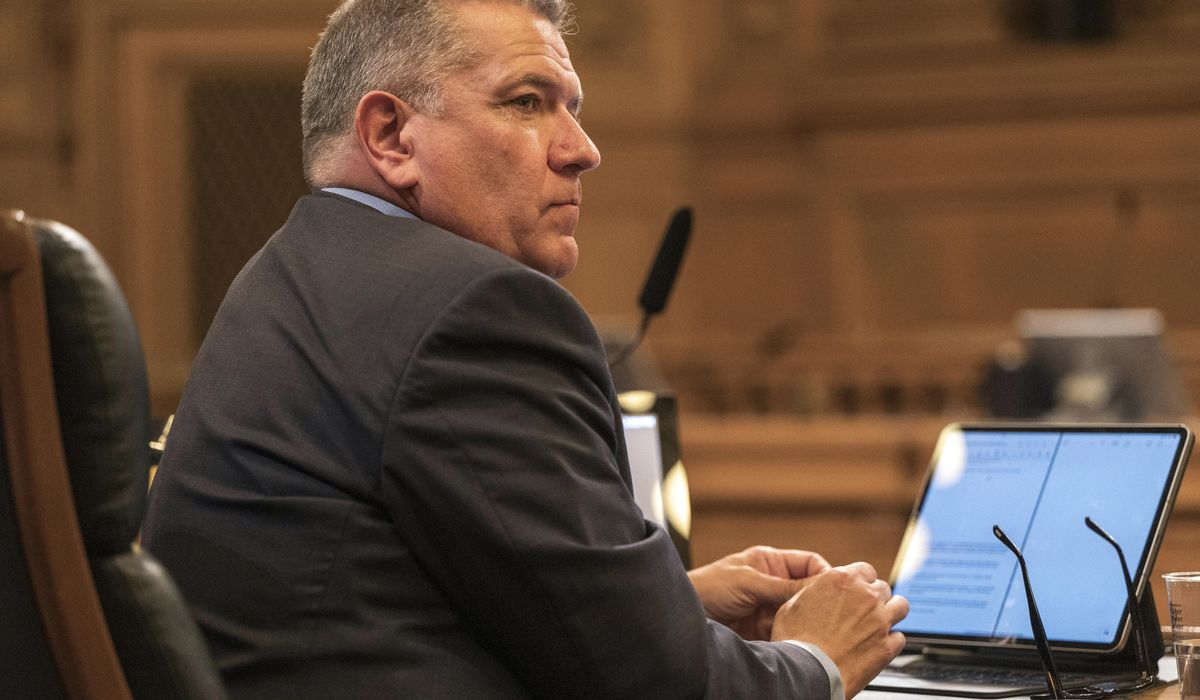


Arresting drug users and forcing them to get clean is one San Francisco lawmaker’s plan to crack down on the unstable, sometimes dangerous addicts who have taken over city streets and turned Democrats’ urban voting base against liberal politicians.
Matt Dorsey, a member of San Francisco’s Board of Supervisors, asked city police and health agencies this month to formulate a plan involving at least 100 drug-related arrests per day and compelling people to undergo detoxes as a way of fighting the fentanyl-driven lawlessness in his district.
Mr. Dorsey said the simple goal is to restore order, but it’s also to preserve Democrats’ vision for running America’s cities.
He said creating more bike lanes and improving housing density don’t matter if residents are “worried about being pushed in front of a subway train” by some person having a drug-induced episode.
He also noted that it’s his party’s most loyal voters who are increasingly having those concerns.
“The people who are living with Democratic Party governance are the most irritated with it because they’re living with the failures of policies that aren’t getting around this stuff,” Mr. Dorsey told The Washington Times.
San Francisco’s mission to put homeless people into housing has guided city policy for years, but Mr. Dorsey said the pandemic exposed the policy as a form of drug enabling and broke locals’ commitment to the cause.
Gov. Gavin Newsom, a Democrat, temporarily moved tens of thousands of homeless people into hotels to prevent spreading COVID-19 in overcrowded shelters.
An independent evaluation last year deemed Project Roomkey a success. In San Francisco, Mr. Dorsey said it essentially converted the hotels into drug dens.
The statewide effort, combined with what he said is the city’s primary interest in moving someone off the street and into government-subsidized housing, exacerbated overdoses as dealers began posting up by buildings to support people’s addictions, with fatal consequences.
Overdose deaths in the city jumped from 441 in 2019 to 726 in 2020, according to the San Francisco Office of the Chief Medical Examiner.
The city hasn’t seen fewer than 600 overdose deaths per year since.
The deadly cycle starts in places such as Sixth Street, where Mr. Dorsey said at least 200 people crowd the sidewalks to buy, sell and use fentanyl, methamphetamines and other narcotics each day.
“San Francisco is becoming, and has become I fear, a destination city for drug use and drug dealing,” he said. “It’s driving other kinds of crimes, like retail theft, issues around street conditions, behavioral health challenges, where people who are in the grips of their addictions are acting out, sometimes violently.”
Mr. Dorsey, who was a spokesman for the San Francisco Police Department before joining the Board of Supervisors in 2022, sent a letter of inquiry to the city police, the sheriff’s office, the fire department, the district attorney’s office and the Department of Public Health to figure how to make the mass arrests and compulsory detoxes a possibility.
He wants the agencies to look into how to increase jail capacity and officer staffing to accommodate the arrest target. It will also take advantage of Proposition 36, a ballot measure passed overwhelmingly in the fall where people repeatedly nabbed for drug use will be given the option of mandatory treatment or up to three years in prison.
Mr. Dorsey said newly sworn-in Mayor Daniel Lurie is aware of his plan, though the two have not discussed it in depth.
Mr. Lurie, a political newcomer who is the heir to the Levi Strauss fortune, won the competitive mayoral race in November on promising to address the city’s quality of life issues, particularly those related to drug abuse. He has already declared a state of emergency in San Francisco over fentanyl.
But not all of Mr. Dorsey’s fellow supervisors support his plan.
Jackie Fielder, a newly elected lawmaker representing San Francisco’s District 9, criticized the letter by saying “arresting people for drug use is not a serious strategy” for the city.
“It has been the strategy for San Francisco since 2021. And it has failed,” Ms. Fielder, a Democrat, wrote on X. “The biggest problem? There is not enough treatment infrastructure!”
The Coalition on Homelessness, a city-based nonprofit group, likened Mr. Dorsey’s proposal to something out of Project 2025, a list of national policy recommendations crafted by the conservative Heritage Foundation and which Democrat Kamala Harris tried to use as a political issue in the last presidential race.
“Jailing people with substance use disorders leads to an increase in overdoses,” the coalition also wrote on X. “Supervisor Matt Dorsey’s tried and failed proposal only perpetuates the revolving door of homelessness. The COH supports a housing first approach and addiction treatment that is accessible.”
Mr. Dorsey told The Times the coalition’s approach to San Francisco’s twin issues of homelessness and drug abuse are what is pushing people toward President-elect Donald Trump, even if those same voters are only supporting the Republican as an act of protest.
As a recovering addict himself, Mr. Dorsey said treating San Francisco’s addicts with “tough love” is the only way out of their current mess. It’s imperative to him that the city acts now before people give up on the Democratic Party for good.
“We’re five years away, if we don’t fix this, from having people vote with their feet,” Mr. Dorsey said. “We could get back to another time like we had in the ‘50s and ‘60s, where it’s just not worth being in cities any more.”
• Matt Delaney can be reached at mdelaney@washingtontimes.com.
